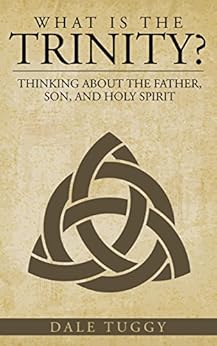AS WITH DR. Hurtado, now with Dr. Tuggy, I have received the
honour of some recognition and interaction over the ideas contained in their respective fields and work. Some may have already read my response to Dale's new book,
What Is The Trinity: Thinking About The Father, Son, and Holy Spirit, which
you can of course still consult here. In fact, I would recommend doing so first and then
reading Dale's response to me on his blog in order to make fuller sense of today's post.
Let's get to it!
I think I stand corrected on an important point: small-t big-T usage with the word "Trinity". I may still not quite be on the money here, but if I understand correctly, Dale is not attempting to establish some new literary practice that he came up with, rather he has seen it and wants to encourage that usage. Be that as it may,
I stand by the "inoperable" assessment. If the distinction can only be made by writing the word down, then how useful and practical is it to have to
say "small-t trinity"? What percentage of people are aware of this practice anyway? Finally, how practical is it when both capitalised and non-capitalised versions are not capitalised in the adjectival form, and how exactly do we go about that anyway? This creates some issues when laid out, and I think we should ask Dale which he thinks is true:
1.
2.
If the answer is 1 (whether someone believes in the Trinity or the trinity, both are "trinitarian"), then not only is the distinction difficult being reliant on a small written difference in the noun form, but once an adjective, even that small written difference is swallowed up. If the answer is 2. (someone who believes in the Trinity is "trinitarian"; someone who believes in the trinity is "unitarian"), then we still have a most peculiar rule set, whereby small-t means one (very significant) distinction in the noun form, but another quite different (simply grammatical) distinction in the adjectival form.
If the answer is both 1
and 2, then further rules (senses) seem necessary in order to prevent a contradiction. Altogether, I believe this is actually quite a complicated state of affairs indeed, and is what I meant by my assessment of inoperable.
Moving on to my criticism of insufficient definition of quite what small-t trinity actually is. Dale responds,
John, you’re overreacting to the word “just” here. In that context the purpose of it is just to let us know that the members of this triad are not necessarily parts that compose some whole, or aspects of some one thing, or even things of the same exact physical status. It is not a comment on the importance of the triad or any member in it. The thing is, the triad might also be a Trinity.
This is very interesting. Actually, as I mentioned in my initial post, I don't perceive Dale's small-t usage as referencing something small or lesser. In the same way he sees me, according to his definitions, as unitarian, I am beginning to see him, according to my definitions as trinitarian. One of our key differences, I think, is that the model I am trying to develop does not start with the ontology of God - it's
conceptual. In my post yesterday I translated some important philosophical contributions made by Paul Ricoeur, because I am particularly interested in the unstated meanings of the institutionalising 4th-century and later Church. We tend to focus on the grand ontological deliberations and damning anathemas. When the church said that God the Father, God the Son and God the Holy Spirit were of one substance, three Persons in One God, the question is not only what could that mean in the apparent, ontological comprehensive sense, but what else did she mean, in the fuller interpretative sense? What were her concerns, her worries, her goals, her injuries, her loyalties, her priorities? How did "she" interpret the biblical texts to join her horizon with the horizons of the New (and Old) Testament texts? (I have already shared how insightful I find the Sirmium II Council to be into this question in my post
Hermeneutic Circle and Asking Better Why Questions).
It's a terrible thing, perhaps, to say, but I actually have found it helpful to put my own beliefs to one side on this. To adopt my own rough model for the emergence of the Triune God (I'm quite enjoying testing the word "triunification" of God) requires no personal faith in Christianity whatsoever. It might help for you to care enough to think about it (let's remember what a tiny minority we are to find this so "crucial"). But an interested atheist or agnostic historian can come to this data and will naturally want to ask the kinds of questions I just stated. How did "substance" help articulate and preserve the collective beliefs and practices of the Church at the time, even if it is entirely symbolic (e.g. zero gods)? My approach is thus to say that this substantialization process is a symbolic hermeneutic that can only mean one thing: they were looking for a way to ground the Father, Son and Holy Spirit in the centre in a way that they already were functioning in practice. Dale - I firmly believe history needs more continuity than the 381
eureka! moment/scenario your model seems to require, because as you say,
the triad might also be a Trinity (even if we mean this in slightly different ways)
.
I find it slightly curious that my usage of the word "mutation" is not more meaningful to Dale. It is the go-to word for some scholars like Crossan, NT Wright and Hurtado (the last of whom has been interviewed on four occasions on the trinities podcast,
here,
here,
here and
here) to express the modifications of religious belief structures that would permit Jews to still be Jews but also a part of the new Christian movement. I've looked in detail at how each of the aforementioned scholars use the term and feel ready to borrow its usage while still critiquing some inconsistency in its use (esp. Wright). So I think I can be considered clear of simple or unthought idea-grabbing on this point. While I teetered on the edge of embracing biblical unitarianism in 2015, it was (geekily enough) recognising that unitarian scepticism around the textual soundness of Matthew 28:19 was so weakly based, especially when I had to concede the baptismal formula in the Didache, some quite ambivalent personal views I have on the gospel of Matthew (love, hate and late), that made me start to question whether or not a form of trinitarianism did indeed actually spring up as early as the first century. I actually believe it did and I can provide some good arguments to back that up and the fourth-century picture is part of that explanation.
On Tuggy's response to my response to Q5, about "absolute equality", the issue of mutation rears its head again. Tuggy points out that prior to the Christ-event, Daniel 7 provides a precedent: "
But to the Jews they were not absolutely unassignable"..."that all sounds like God stuff! It is! It is from him". One of the mutations that Tom Wright highlights about resurrection in Judaism and resurrection in Christianity, is that
it (resurrection) has shifted from being a marginal belief to something at the centre - he specifically identifies this relocation as a "mutation". Daniel 7 is a pretty awesome text, but, as with bodily resurrection, it does not seem to have captured messianic hopes in mainstream pharisaic Judaism, which is what Dale's comments could be construed to imply. It is unclear to me even if we can be sure that Jesus or his disciples would have had access to that particular text, although I am inclined to think that they may well have had access to the Parables of Enoch (and possibly Daniel). Larry Hurtado is much more sceptical on this point even than me: zero precedent for this kind of Jewish cultus of Christ. I would point out, however, even if this were a mainstream hope, which it most certainly does not appear to be, it would be one thing to hope for such a figure in the future and quite another to believe that this one like a Son of Man had indeed come as the Messiah and God now required that worship of him be carried out in a way only anticipated beforehand and otherwise reserved for him alone.
Dale's response to the centrality of Jesus and the Spirit is still engaging with the issue from a different standpoint - he can agree on centrality, without any modification to the theology, by which he means the unity of the one God although allowing for modification of the messianic category. But when you examine the issue historically, seeing each set of religious thinkers as interpreters of those before them, then the only way you can get from Point A (monotheistic unipersonal God) to Point C (monotheistic tripersonal God) is via a Point B.
There has to be a point B - no, indeed God is not yet triune, but something has changed via his exaltation of Christ and the participative rule empowered by God's sent Spirit. This is something we can identify as a historical religious phenomenon of reconfiguration. As an atheist, agnostic, trinitarian, Trinitarian (oops, sorry ;)), Unitarian, Buddhist, Muslim or whatever your personal faith, none of that
matters on this point. You can't teleport Christianity from Point A to Point C, and that Point B simply has to have something to do with the substantial changes and mutations Christianity has been firmly recognised to have brought from within its Jewish contingent. Could it not be that fourth-century
ousia is symbolic for religious centrality? Reconfigured divine space? Again,
I don't mean real divine space! I refer to the psychological, conceptual and, I believe it is the correct word having looked a little into Ricoeur's work now,
phenomenological space hitherto accorded to Yahweh alone.
On the divine
logos category, Dale asserts correctly: "
It seems to me that he’s really using Jewish categories". I think I get his point, Jewish usage of this "through whom" business in the New Testament is natural and certainly precedes John, who simply clarifies it a bit more than Paul, for instance. It is worth remembering that a lot of Jews at the time may not have known much Hebrew or Aramaic - this was one of the reasons driving the third century BC translation of the Septuagint in Alexandria into Greek. It should still be considered remarkable that these "through whom"s were so readily applied to Jesus so quickly. The Jewish Christians were "primed".
Q6 is really about worship of the Holy Spirit. It is interesting here to note that Tuggy seems to side with Hurtado on this one. Hurtado points consistently to what he calls a "binitarian worship" practice among the earliest Christians. That's distinctly one less than three - however, if pushed to Tuggy's standard of "primary trinitarianism", Hurtado's binitarian usage would fail (Hurtado is not claiming that God himself is binitarian in the first century, it is the
act of worship that it binitarian, see my post on this point
here: Lord Jesus Christ, by Larry Hurtado, Part 9: what does Hurtado mean by "binitarian"). My argument, however, contra Hurtado, is that since religious experience would have been best understood by the central revolutionary empowering presence of God of his Spirit, that God is now more firmly located next to his Son in heaven and other distinguishing aspects I will be laying out in my presentation of the forces and factors determining the first century triune hub emergence. Although founded on some traditional creedal authorities, it would be an assumption I think for many evangelical Christians to suppose they worship the Spirit, also calling "him", "Lord". The point here is that contrary to Dale's insistence that the Trinitarians have got it wrong on this one, most evangelical trinitarian practice I know of simply agrees with the New Testament practice Hurtado calls "binitarian" (provided they haven't subsumed the Father into Christ). On over-personification of the Holy Spirit, Dale should remember I share the same reservations, and I still stand by most of what I wrote that he
published on his blog, demanding more evidence from social trinitarians of the Holy Spirit as a giver and receiver of love among the other Members.
Dale closes this point stating that he has never heard of nor seen New Testament evidence for a Triune Hub, such as I suppose, and that this idea lacks clarity for him. I take his challenge very seriously - I need to be ready to give a clear presentation of my thesis, and I am pondering doing a youtube video, while at the same time shuddering at my lack of skills in that area. Some followers of the blog will know that I have also made some approaches to book publishers with the idea, which has improved with each submission. Thus far I have tried Wipf & Stock (rejected), Austin Macauley (accepted, but I'd prefer a specialised publisher), SPCK (rejected, although some apparent interest) and now Paternoster (currently under review). If you would like to contact Paternoster to encourage them to take on my project, then please write to Authentic Media Submissions at submissions[at]authenticmedia.co.uk regarding John Bainbridge's book proposal - thanks! Of course, I can also send you what I wrote to them beforehand.
On the concept of the hub itself, I have tried on numerous occasions to summarise it into a sentence or two, so I guess I could have another go now. The model is a semantic one, it wants to look at how Jews, then Christian Jews and then later Christians could triunify God. It understands and accepts that as
neurotheological research has pointed out, the human brain's association with the religious world is actually interconnected. Neurotheology recognises that there is neither a "God Gene" nor a brain "God spot". We are wired to explain a world in which establishing and influencing causality enhances our chances of survival. All cultures have developed with religious beliefs and practices, some establishing a plurality of divine beings, some with one above the rest and others with exactly one, like Islam. I'm not yet completely convinced that the Christian mutation occurred at a time in Jewish history when henotheism (multiple gods, but one above them all) was not the more accurate or representative worldview for them. The semantics and practices around the gods or god of religions are detailed and change over time, although are usually constrained for the more stable religions to ensure continuity with and preservation of sacred revelations of the past. The concept of God, however, shifted astoundingly quickly according to Hurtado. No longer was there God and his emissaries, but now, following the sudden events around the first Easter, is his Messiah forever reigning at his right hand, whom he commands be worshipped.
Such divine reverence, Hurtado argues compellingly, was reserved for Yahweh alone...
until now!
"
Inasmuch as exclusivist monotheism is manifested essentially...in a refusal to offer worship to any figure other than the one God". (
LJC Ch. 1). Furthermore:
[W]e have no analogous accommodation of a second figure along with God as recipient of such devotion in the Jewish tradition of the time, making it very difficult to fit this inclusion of Christ as recipient of devotion into any known devotional pattern attested among Jewish groups of the Roman period. [KL 919, my emphasis], see also
my post on Hurtado,
"Part 8: the line no-one ever crossed"). The point is that for these Jesus-worshipping Jews, their religious concepts were in a state of flux. Certain rules no longer applied. Some of these were about worship. Others were about a single-stage eschatology. Others were about resurrection. Others were about the participative (as opposed to interventionist) nature of the Kingdom of God. Others were about the temple. All of this was in sudden movement as God started to play some cards that he had previously only hinted he held. The result was Jesus-worship to the glory of God the Father in the Holy Spirit; in fact, the "proto-orthodox" church saw it their duty to sustain these revealed modifications, a process which began before the close of the New Testament canon. Matthew, for instance, one of the most Jewish books of the New Testament canon, is responding to some confusion over baptism as he has witnessed not least in reading
Acts 8:14-25 and
18:24-19:8, and ensures that baptism "into Jesus" is absolutely about receiving the Holy Spirit by placing this on the authority of Jesus' own lips post resurrection. All the major acts of God begin to be
reconfigured around the Father, Son and Spirit (see
this Stephen Holmes video for a clearly articulated argument on this, especially the Q&A at the end).
Prior to Jesus, Yahweh filled that religious centre in the Jewish
mind. It was slightly blurrily edged at times, but worship seems to be the big dividing line in the Jewish
mind. I slightly prefer "hub" to centre, because you can have a static centre or core, like a building, but a hub is dynamic. It turns and interacts with its surrounding elements. That semantic hub looks different now. That's more than a couple of sentences, but I'm just trying to be clear and yet still not extend into the chapter-length necessary to deal with this new angle.
On Q. 7 about persons, Dales asks:
What difference does it make if we go on to talk about this, “hub” thing? In what way are you trying to tweak either a humanitarian or a subordinationist unitarian theology? I am trying to understand how it is possible to end up with a Triune God from the New Testament conceptually, even symbolically. The clearest example we have of the paradox I discovered listening to your podcast episode 177 on the Second Sirmian Creed. The paradox, if I follow Ricoeur's encouragement to decode deeper meaning, is that the precious Trinity is both to be preserved forever, while One (the Father) is greater than the others. I believe that for a stabilising institution, this made for a lopsided and unstable Trinity. What is greatness? Might it not be religious centricity? If "all are central, but one is more central than the others", then we find ourselves in Orwell's paradoxical
Animal Farm...
On my two additional comments, Dale seems to concede my point, without explicitly going back on his language in his book of the Holy Spirit's mention in 325 being an "afterthought".
On the second point about risking going around misleading people about my love for the Trinity (i.e. articulating my own spiritual life and purpose around the F, S & HS), I feel no shame nor risk. On the contrary, I believe most people need a simpler emphasis on all three (my 7-year-old was delighted to discover that there were "3 of them"! even though he does not yet need to ask quite
what "them" means, and God, Jesus and the Holy Spirit remain distinct for him, or at least I hope). Most people haven't ever heard the word "Triune" before. I'd been a Christian for over a decade and only doing a Bible course to consolidate my faith and knowledge of Scripture at age 21 do I remember hearing it for the first time. In practice, I hardly ever use the word Trinity, but I simply emphasise and articulate my faith in as threefold a manner as I know how and feel remarkably safe there.
Very nearly there...
Dale says:
I have the impression that you’re groping for a sort of middle ground between unitarianism and trinitarianism. I don’t see why we need that though. Queue: Paul Ricoeur. Rarely known fact: this influential Christian philosopher actually
helped train French President Emmanuel Macron. The book chapter I have been doing some posts on over the last couple of days has a lot to do with arbitration, the title of the book is aptly named
The Conflict of Interpretations. Having examined both sides of this trinitarian debate in some depth, I can safely say that both positions have strong points. I don't care much for "groping" - but I am indeed
scoping out ways in which dialogue between these two sets of perspectives can lead to a more harmonious reading of the texts. Here's a very small example, one that set my religious foundations into a state of dangerous tremor when I began to see it just three years ago: just look at all those simple "and"s between God and Jesus. This is not a complicated "and", say the Unitarians. And they are right, but that position gets tricky when that same simple "and" (along with other sharp distinguishing linguistic features) comes between the Father and the Spirit.
Finally, Dale closes with:
Before, you’ve expressed incredulity at the idea that mainstream Christianity could go from a unipersonal God to a tripersonal one, in the 4th c. I agree that at first glance, this is a big surprise. But I think I sort of see how it went, in the minds of some of the speculators whose views prevailed. At least, I’m starting to. Long story, though. Yes it is! I think that is my point - it has to be a lot longer than is sometimes implied. And it is also the key story that we are all dying to hear and that I haven't yet heard told satisfactorily. Looking forward very much to hearing more of what you have started to see :)
What a fascinating exchange! Thanks so much Dale, I have really appreciated it, and for making me think so very hard about this issue.











